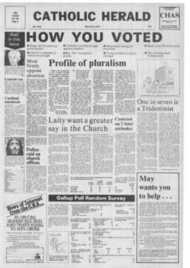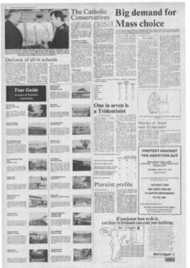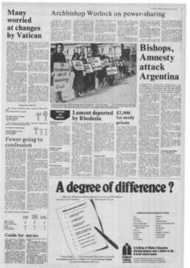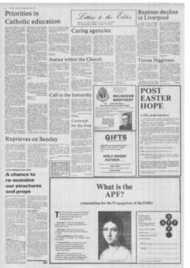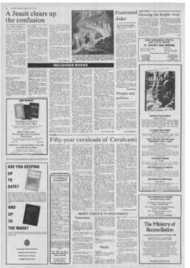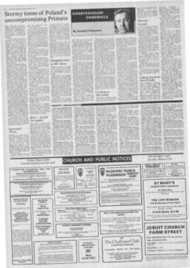Page 9, 25th March 1977
Page 9

Report an error
Noticed an error on this page?If you've noticed an error in this article please click here to report it.
Tags
Share
Related articles
Christ On The Silver Screen
Priesthood Identified For Both Sexes
Why The German Bishops Fear Hans Kling
The Bond That Was Forged On Calvary
'silent Night' Still Pours Royalties Into Charity
Actor says Jesus part 'hardest I've ever done'
ROBERT POWELL is a much-interviewed man. He will talk about darts and cricket to the Evening Standard or expand on philosophical Christianity to the News of the World. He is truly a man of many parts.
His power to attract journalists has proceeded unabated since he was chosen by Franco Zeffirelli to take the title role in Lord Grade's film "Jesus of Nazareth". The six-hour television production is to be shown in two sections, on April 3 and April 10.
The production is lavish: so far expenditure has topped £17 million. The cast is highly distinguished. Although Elizabeth Taylor could not be persuaded to play Mary Magdalene, Lord Olivier and Sir Ralph Richardson have minor parts.
Filming took place in Tunisia and Morocco and lasted for nine months. Ironically this Christian epic had to be filmed in Muslim countries since the real sites in the Holy Land have been so cluttered up by shrines and pious monuments.
By the time the film is televised Robert Powell will have been involved with the part of Jesus for two whole years. It was a mammoth undertaking to accept the role.
He admits that vestiges of "Jesus" will remain with him throughout the rest of his career. Fortunately he does not feel typecast — that would be rather a dead end.
The part called for an extrao rdin ary amount of dedication. When on location he worked a six day week. He spent 14 hours each day filming, followed by three hours preparation for the next day's work.
He does not expect to have to put quite as much energy into any other role. "It is the hardest job I have ever done and the one I cared about most."
He had to grow a beard and lose two stones in weight to achieve the ascetic appearance demanded by Zeffirelli. There is no doubt in his mind that it was all worth while. He is not daunted by the many versions of Christ's life which have been already made.
"It has not been done properly by the mass media before. No one has done the story justice. It is a magnificent story — the old cliche is true, it is the greatest story ever told.
"It was up for grabs, and we had a go. I think what we have done is better than what any one else has done, but that's not to say it won't be bettered. I think ours is a genuinely more honest approach than the others."
Lord Grade does not regard it as competent ephemera. He has said that he hopes it will earn him respect and money for the next 200 years.
To accompany the film Collins has produced a lavish picture book and a paperback written by William Barclay.
Clearly the film may have great proselytizing influence but this is not a consideration which interests Robert Powell. He has no faith in the divinity of Christ. His research for the film has convinced him that Christ was the greatest man who ever lived — nothing more.
He explains his atheistic approach with sophistry which was old-fashioned when Plato was sharpening his stylus. "When I hear people attempting to argue or prove that Christ was or wasn't the Son of God, to me it seems irrelevant because the result is exactly the same. "Whether he was the Son of God or not, 2,000 years later there are still 600 million people who believe he was, so the effect is identical. If we believe he was the Son of God then he was."
Although without spiritual faith in Christ, the film had led him to accept Christ's teaching as pre-eminent. "What Jesus lived for and what he said I consider the most profound things that have ever been said about mankind."
The Sermon on the Mount made a great impression on him. When the scene was first shot he found the power of the words took him over and by the end all the Moroccan extras were clapping and the Italian film crew were crying.
"If I could evoke that feeling, think of the effect he must have had. It must have been electrifying. In 2,000, years nobody, not even Lenin or Marx, has come up with a more profound and concise formula for people to live by. Human beings have got to consider it if they are to survive at all ..."
Robert Powell is clearly worried that he might be identified with the divinity his rational mind cannot accept. He frequently points out that he is just an actor, an ordinary man.
His extensive study of the Gospels and the Patristic commentaries have given him a very clear picture of Christ's personality. He is irritated by being continually asked whether he „sees Christ as a Che Ciuevara or a Billy Graham. Such categorisation is insulting and the truth lies between the two.
He finds the idea of a meek and gentle Jesus unattractive and highly unlikely. "He led a hard life; he wouldn't have been able to stand the strain unless he was physically very tough."
he more fiery aspects of Jesus' nature appeal to him. lie. feels Jesus is more credible as a tiger than as a lamb. "His anger must have been frightening. He was not soft and gentle with the Pharisees or the traders in the Temple.
"We forget the frustration he must have felt with people constantly pressing him for a miracle but not listening to what he was trying to teach them. I feel this frustration is an important element of his preaching. But his anger was always bred of compassion."
Although Robert Powell could identify with the human character of Jesus, this was not enough for Zeffirelli. He had to overcome his own rational reservations since the script is quite unequivocal about Christ's divinity,
"I had to play somebody six inches off the ground: somebody divine who could at the same time communicate with farmers and fishermen." The apparent contradicion resolved itself, but the impossibility of it kept him awake at nights.
The other great strain was the preaching. The leading actor in any normal film might expect the lion's share of the dialogue, but in this film he had to cope with extended monologue directed at vast groups of Moroccan extras.
He made sure that interpreters explained to extras what was being said so that he was not confronted by a sea of uncomprehending and completely bored faces. Technically the film was a great challenge, but it was also fraught with problems of religious politics. Vatican representatives and the Archbishop of Canterbury were among the religious consultants.
It is a financial proposition, and offending people is not good for profits, so Zeffirelli had to steer the film through a hazardous middle course.
Robert Powell mentioned the Jewish lobby in America, who wanted to make sure that the Jews were not blamed for the Crucifixion, and the pressure from the Vatican to include a monologue of Johannine theology at the Last Supper.
He did not mention the American company of General Motors which has withdrawn their sponsorship following a Baptist campaign against the film.
Dr Bob Jones, an influential South Carolina preacher, had threatened that if General Motors continued backing the film true believers would "make their protest known both verbally and by spending their automobile dollars elsewhere."
The film "Jesus of Nazareth" has been .welcomed by leaders of the Mormon and Jewish communities. Fr Agnellus Andrew, the director of the Catholic Radio and Television Centre, has congratulated Lord Grade on his achievement.
After seeing the film at a private viewing in London, Cardinal Hume seemed greatly impressed by it. "The realism was quite fantastic. I think this film will make a lot of people read the Gospel with a new meaning." He said he found parts of it very moving and was pleased that the deeper meaning and mystery of the story came througI..
Zeffirelli admits he has consciously attempted to demythologise the story. There are no mechanical wonders: divine messengers are represented simply by use of strong white light.
But there is also faithful adherence to the Gospels and tradition. The Wise Men are Kings and they come in triplicate with their eighth cen
tury Irish names Caspair, Melchior and Balthasar.
So far the only people to complain about the film have been those who have not .seen it. Robert Powell is sure that even the strictest Catholic could not manage to be offended by it. He admits some people will be worried that Christ is not seen after the Resurrection.
"We had three attempts at shooting the Resurrection but there was no way we could top the Crucifixion. I don't appear after the death on the cross but it's clear from everybody's reactions that I have risen."
It would be a pity if Catholics dismissed the film because it admits its limitations. Much effort has been put in to portraying God made Man. It is beyond any actor to portray Christ glorified. There are still some miracles that exceed our celluloid sophistication.
Frances Gumley
blog comments powered by Disqus


